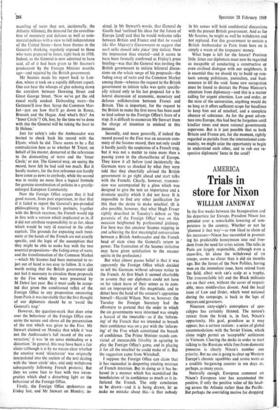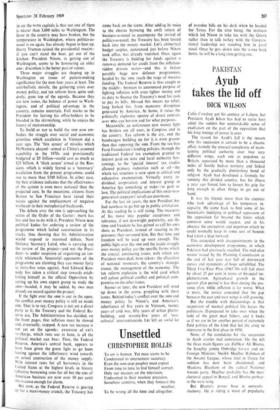Trials in store for Nixon
AMERICA WILLIAM JANEWAY
In the five weeks between the Inauguration and his departure for Europe, President Nixon has presided over a remarkable lowering of tern- perature in the country. Whether or not he `planned it that way'—as FDR liked to claim of his successes—Nixon has succeeded in promot- ing his predictable honeymoon into real free- dom from the need for crisis action. The talks in Paris are largely responsible, although even a cease-fire, let alone the withdrawal of us troops, seems no closer than it did six months ago. But the forces of the New Politics, having won on the immediate issue, have retired from the field, albeit with un's scalp as a trophy. The irreconcilable left and the Black militants are on their own, without the cover of respect- able, mass middle-class dissent. And the local issue of Law and Order, which went national during the campaign, is back in the laps of mayors and governors.
Nineteen sixty-eight's atmosphere of apo- calypse has certainly thinned. The nation's retreat from the brink is, in fact, Nixon's opportunity. His goal, grandiose as it may appear, has a certain realism : a series of global accommodations with the Soviet Union, which alone might permit an 'acceptable' settlement in Vietnam. Clearing the decks in order to start talking to the Russians while free from domestic pressures is clearly Nixon's number one priority. But no one is going to clear up Western Europe's chronic squabbles and revive NATO as a credible bargaining counter in ten days or, perhaps, as many years.
Naturally enough, European comment on Nixon's European tour has accentuated the positive, if only the positive value of his head- ing across the Atlantic rather than the Pacific. But perhaps the overriding motive for dropping in on the NATO capitals is that not one of them is nearer than 3,000 miles to Washington. The fever in the country may have broken, but the
temperature in Washington, where politics-as- usual is on again, has already begun to heat up.
Harry Truman coined the presidential maxim: if you can't stand the beat, get out of the kitchen. President Nixon, in getting out of Washington, seems to be honouring an older one : discretion is the better part of valour.
Three major struggles are shaping up in Washington on issues of pattern-making significance for the next four years at least. The anti-ballistic missile, the gathering crisis over money policy, and tax reform have, quite sud- denly, gone top of the agenda. Because they are new issues, the balance of power in Wash- ington, and of political advantage in the country, remains uncertain. Full marks to the President for leaving his office-holders to be blooded in the skirmishing, while he enjoys •the luxury of statesmanship.
To build or not to build the ABM now em- bodies the struggle over social and economic priorities which escalation in Vietnam did a year ago. The 'thin screen' of missiles which McNamara okayed—aimed at China's assumed capability in the 1970s and provisionally budgeted at $5 billion—could cost as much as $25 billion. A 'thick screen' aimed at the Rus- sians, which is widely feared as a 'necessary' escalation from the present programme, could run to more than $100 billion. In either case, the best evidence indicates that the effectiveness of the system is even more notional than the projected cost. In the meantime, citizens from Boston to San Francisco have raised their voices against the emplacement of megaton warheads in their metaphorical backyards.
The debate over the ABM is approaching the status of the Order of the Garter: merit has
less and less to do with it. President Nixon, won political kudos for ordering a review of the programme which halted construction in its
tracks, thus showing that his Administration
would respond to reasoned debate. Now Defence Secretary Laird, who is carrying out the review of the project—and not the Presi- dent—is under suspicion of organising an Lei- style whitewash. Senatorial opponents of the programme are claiming they can muster forty to forty-five votes against. And Edward Ken- nedy has taken a critical step towards estab- lishing himself as the official Opposition by setting up his own expert group to study the ABM—headed, it may be added, by two men already on record against the project.
If the fight over the ABM is out in the open, the conflict over money policy is still an inside one. That is to say, Congress is not yet a direct party to it; the Treasury and the Federal Re- serve are. The Administration has decided, on the front pages, that inflation must be slowed and, eventually, stopped. A new tax increase is not yet on the agenda: extension of Lei's surcharge, which runs out in June, is all the political market can bear. Thus, the Federal Reserve, America's central bank, appears to have been given the green light to go from leaning against the inflationary wind towards an actual contraction of the money supply. With interest rates for all borrowers in the United States at the highest levels in history (effective borrowing rates for all but the osis of American business are now over 10 per cent) this is cause enough for alarm.
But now, as the Federal Reserve is gearing up for a maxi-money crunch, the Treasury has come back on the scene. After adding its voice to the chorus hymning the swift return of business-as-usual to accompany the revival of politics-as-usual, the Treasury has been forced back into the money market. Las's chimerical budget surplus, announced just before Nixon took office, has already vanished. Once again the Treasury is bidding for funds against a
runaway demand for credit from the inflation- ridden private sector—and this is before possibly huge new defence ' programmes, headed by the ABM, reach the stage of massive funding. The Federal Reserve is thus caught in the middle : between its announced purpose of fighting inflation with even tighter money and its duty to finance the Treasury's need for cash to pay its bills. Abroad this means no relief. long looked for, from monetary disruption generated by America. At home, it raises the politically explosive spectre of direct controls over who can borrow and for what purposes. Meanwhile, an unforeseen new money fight has broken out all over, in Congress and in the country. Tax reform is the cry, and the bandwagon building up for it is even greater than that opposing the ABM. From the tax-free Ford Foundation's lending policies, through the traditional Federal tax exemption granted to interest paid on state and local authority bor- rowings, to the 'special interest' tax credits allowed primary industries such as oil—the whole tax structure is now open to critical and exhaustive examination. Virtually every in- dividual, corporation and interest group in America has something at stake—to gain or lose. The political implications of this once-in-a- generation taxpayers' revolt are enormous. For the last six years, the new President has had nowhere to go but up in public estimation. At this reading he is still rising. The measures of his move into popular acceptance and tolerance, if not downright popularity, are the time and freedom he has gained to call his own shots as President, instead of reacting to the pressures that surround him. But that time and freedom will be used up soon enough. The public fight over the ABM and the inside struggle over money policy are the specific forms which the crucial, continuing issues, with which any President must deal, have taken: the allocation of national resources, the country's strategic stance, the management of the economy. The tax reform explosion is the wild card which will colour political conflict and political com- promise on the other issues. Sooner or later, the new President will wind up down in the arena, grappling with these issues. Behind today's conflict over the ABM and money policy lie Nixon's, and America's. inheritance of five years in Vietnam, twenty years of cold war, fifty years of urban ghetto- building, and seventy-five years of 'neo- colonial' interventionism. LB.t left an awful lot
of overdue bills on his desk when he headed for Texas. For the time being, the instincts which led Nixon to take tea with the Queen rather than to talk turkey with the Congres- sional leadership are standing him in good stead. Once he gets down into the arena back home, he will be a long time getting out.



































 Previous page
Previous page